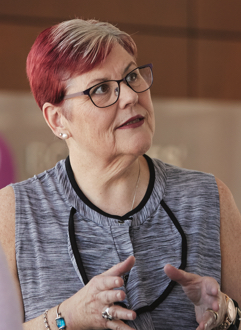Inspiring a shared vision
Building trust and facilitation relationships are at the heart of Suellen Larsen’s leadership practice.
Born at St. Paul’s Hospital and raised in North Vancouver, Larsen hails from a local pioneer family that cut the road into Lynn Valley and ran the first sawmill in the area.
 Larsen learned to be resilient at an early age. An eldest child, her father left when her youngest brother was just three weeks old, and Larsen helped raise the family. Larsen’s mother was also a nurse who worked at St. Paul’s to support the children.
Larsen learned to be resilient at an early age. An eldest child, her father left when her youngest brother was just three weeks old, and Larsen helped raise the family. Larsen’s mother was also a nurse who worked at St. Paul’s to support the children.
Larsen is now a third generation nurse. An RN/RPN, she’s worked at Coquitlam’s Forensic Psychiatric Hospital for the past 20 years. An experienced steward, she also serves as the mental health advocate for BCNU’s Simon Fraser region.
Larsen wasn’t sure if she was going to continue the family nursing tradition when she was younger. “I wanted to be an actress,” she laughs. But she eventually agreed to pursue nursing for practical reasons, albeit on her own terms. “No acting? Well I’ll just show you guys – I’m going to go into psych nursing not just regular nursing,” she jokes when remembering how she landed in the mental health field.
 She has no regrets about her choice. “I’ve been blessed in my nursing career,” she says. “In some ways it is kind of like acting – you are acting on behalf of other people and you put on a different mask when you are dealing with someone who is terminal or somebody who’s had a diagnosis that is going to have life-changing implications, and helping them come to terms with it.”
She has no regrets about her choice. “I’ve been blessed in my nursing career,” she says. “In some ways it is kind of like acting – you are acting on behalf of other people and you put on a different mask when you are dealing with someone who is terminal or somebody who’s had a diagnosis that is going to have life-changing implications, and helping them come to terms with it.”
Larsen graduated from BCIT in 1978. “Although I’d found my calling, I also began to recognize the limitations,” she recalls. “For RPNs in the 1970s there were just a few large institutions in the province and no work in the community – and RPNs couldn’t work in the psychiatric units at lower mainland acute-care hospitals,” she explains. “I needed to get an RN designation.” She went back to school and graduated from Douglas College in 1980 as valedictorian of her nursing class.
For the next 20 years Larsen worked at Whitehorse General Hospital in the Yukon while raising a family. It was an ideal setting to consolidate her practice. “I worked in every area of the hospital and used my psychiatric skills regularly,” she says. “Mental health training crosses all boundaries – we use it in emergency and we use it in maternity.”
Larsen spent 10 years serving as th mental health coordinator at WGH. It was during this time that her nursing advocacy grew. “Ten years into my tenure at WGH they decided to put in a strategic mental health program,” she recalls, “but I did not want to head it as long as it was doctor driven. The nurses and other health care workers are the people who see the patients 24-hours a day and we should be able to refer somebody if we believe there is an issue.”
In 1999 Larsen and her family moved back to the lower mainland where she began working in Forensics. The occupational health and safety challenges the facility faces are well known, but this hasn’t stopped Larsen from being a leading force in the effort to make the hospital safer as a result. She recently challenged management about its orientation and mentoring practices. A new program was created to help keep new nurses safer.
“They were hiring brand new nurses into part-time and even full-time roles specifically for the night shift,” says Larsen. “We had already witnessed new nurses in the casual pool being brought in and not properly oriented to nights, where the nurse in charge has over 20 patients.”
“Can you imagine?” she asks. “Over 20 of the province’s most severely mentally ill people whom you’ve never worked with. You’re in a maximum security setting, you don’t know the program model and you’re a brand new nurse.”
 Larsen recalls the meeting where her concerns about poor orientation and mentoring came to a head. “I had the ear of the director of nursing, my manager and the health authority vice-president, and I had just learned that week that I had a brand new nurse with only four months of experience in an extended care psychiatric area coming to work part time on the night shift on my unit, and they were going to give her one night of orientation.
Larsen recalls the meeting where her concerns about poor orientation and mentoring came to a head. “I had the ear of the director of nursing, my manager and the health authority vice-president, and I had just learned that week that I had a brand new nurse with only four months of experience in an extended care psychiatric area coming to work part time on the night shift on my unit, and they were going to give her one night of orientation.
“I said that’s ridiculous, and that she needs to have a minimum of one to two months on the psychiatric intensive care unit working days in order to understand the program model, understand who she’s dealing with and become familiar with the patients that we have.
“I stood up and took on a mentor role for this member on the condition she receive two months or orientation,” reports Larsen. “We’ve now gone from three days of orientation for new staff to at least 10 days, and a program is now in place.”
Larsen’s ability to effect change is built on the relationships she has developed with co-workers. She recalls working on a disability management issue as a steward when a member asked her to represent him because he trusted her. “That was a pivotal moment for me to begin advocating,” she says.
“I challenge people. I have no patience for gossip and rumour mills and I will not tolerate them – and word gets around about me!” she remarks when asked why members trust her. “They call me Momma Bear because I’m one of the older nurses and they say momma’s bar is real high – you better make sure you try and reach for it.”
Larsen has fully embraced her leadership role on her regional executive. “It’s been a wonderful evolving journey and something that you make your own,” she says. “I get to work closely with our regional OH&S representatives and I’m also working on the Fraser Health Violence Prevention Committee and the PHSA and Fraser Health Psychologically Healthy Workplace committees to help implement the CSA Standard on psychological health that’s now in our collective agreement language.”
Educating and raising awareness of the importance of mental health remains Larsens’ top priority in the year ahead.
“As nurses, our mental health is germane to our ability to provide safe patient care.”
“Now it’s important to educate all members and have them bring that information back to their co-workers and occupational health and safety committees and to union management meetings. It’s a member’s right to have a critical incident stress debriefing – it’s not a manager’s right to decide. We have to be able to have that autonomy in recognizing our professional practice issues when it comes to our mental health.”